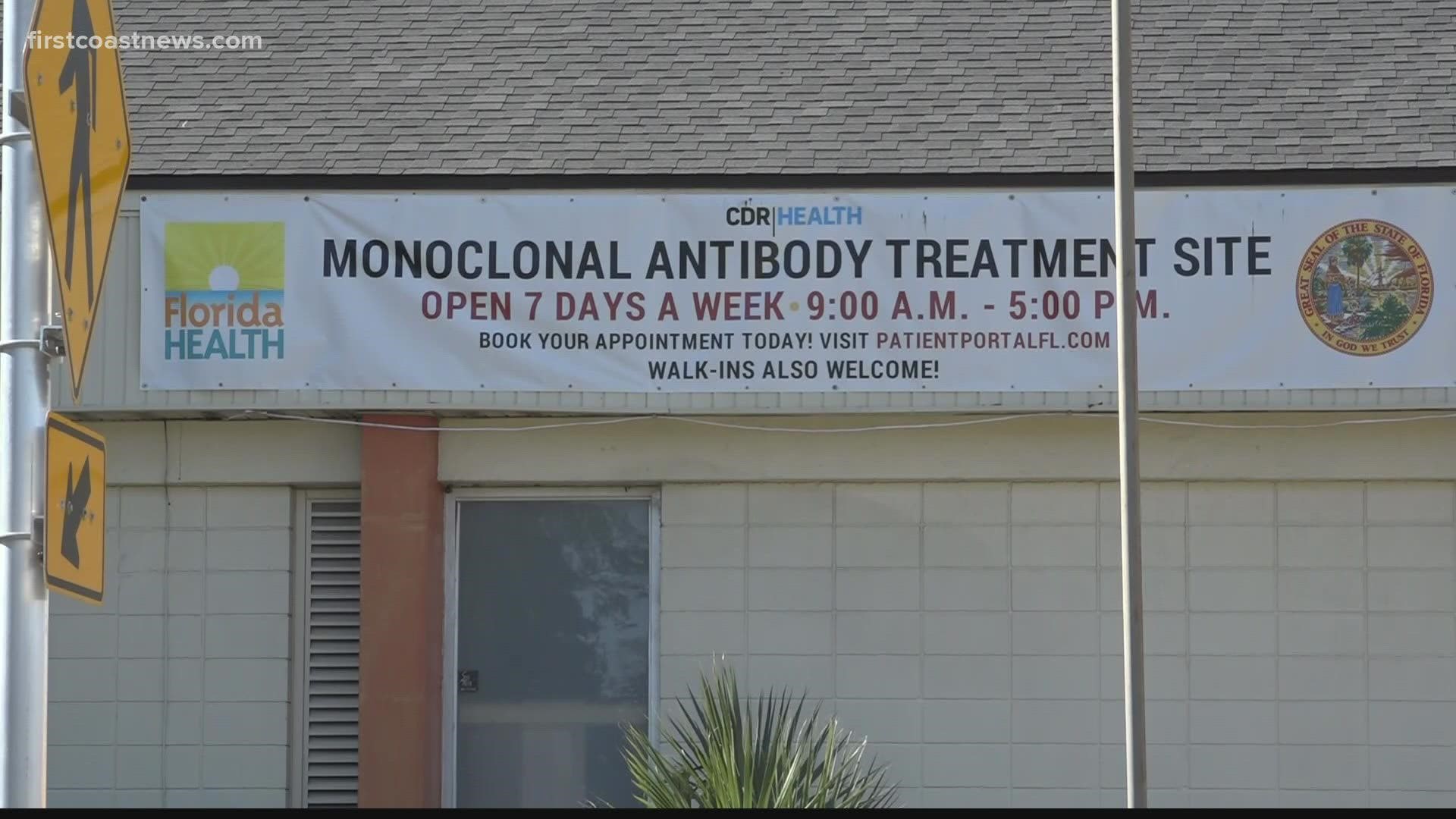FLORIDA, USA — A sudden stop to some COVID-19 antibody treatments.
It's what the Federal Drug Administration is calling for after revoking its emergency use authorization for the Regeneron and Eli Lilly drugs, saying they're unlikely to work against the Omicron variant.
The decision came late Monday afternoon, and didn't come as a surprise to Jacksonville infectious disease expert Dr. Mohammed Reza.
"We're seeing 99% of new infections across the United States is due to the Omicron variant," Reza said. "So, giving something that is not effective is not helpful. The companies themselves are saying the same thing, these monoclonal antibodies are not effective."
He says there are alternate therapies out there to battle early COVID-19 cases, including two new antiviral pills from Pfizer and Merck, but both are in short supply.
"There's only a couple of pharmacists who do have it available and if they're there, they're only there for a couple hours," Reza explained. "So, I would love to see more readily available medications, especially ones that can give to patients by mouth to decrease risk of heart position. We're just not there yet."
There's also the Sotrovimab antibody treatment, which was authorized in May.
So, what does this mean for the Jacksonville sites?
As soon as the news broke, First Coast News reached out to Jacksonville Mayor Lenny Curry's office, but have not yet received a response.
There are two state-supported, antibody treatment sites in the city.
The company that runs the one at the Joseph Lee Center says it's in the process of cancelling appointments. First Coast News did not hear back from the company who runs the Southside Community Center site.
However, the Florida Department of Health (FDOH) announced late Monday night that monoclonal antibody treatment sites will be closed until further notice.
FDOH's press secretary also forwarded First Coast News an email that it sent to the US Department of Health and Human Services (HHS).
It says the state has not received an answer regarding its request for additional doses of antibody treatments for its sites.
"Our request included doses of Regen-COV, which we understand the U.S. Food and Drug Administration (FDA) just halted deployment," Deputy Secretary for Health, Kenneth A Scheppke, wrote.
"For some reason, states were not informed prior to this announcement…Rather than transparent communication from the federal government to states, decisions continue to be made through news cycles and this actively prevents states from making operational decisions that actively save lives.... Florida disagrees with the decision to halt regen-cov in the absence of clinically-based evidence, which to date has not been provided by the FDA," the email said.
The state is expected to speak with HHS Tuesday morning.
Below is the full email that the Florida Department of Health forwarded to First Coast News.
"Dear HHS Leadership,
Thank you for the robust discussion on January 14, 2022, regarding allocations of monoclonal antibodies (MABs) and oral COVID-19 antiviral therapeutics.
Over the last week, the Florida Department of Health (Department) has reached out numerous times to our usual counterparts at the US Department of Health and Human Services. Unfortunately, to date, they have not replied with a status report or any follow up information regarding Florida’s request for over 30,000 doses of both Regen-COV and sotrovimab monoclonal antibody treatments to be administered at our state-supported sites. Our request included doses of Regen-COV, which we understand the U.S. Food and Drug Administration (FDA) just halted deployment. For some reason, states were not informed prior to this announcement.
While we were hopeful to immediately connect on this timely and important issue, unfortunately, you were no longer able to accommodate our request for a call today and cancelled.
We believe the decision to delay our meeting was made with the awareness that this would be announced. Rather than transparent communication from the federal government to states, decisions continue to be made through news cycles and this actively prevents states from making operational decisions that actively save lives.
To be clear, Florida disagrees with the decision to halt Regen-COV in the absence of clinically-based evidence, which to date has not been provided by the FDA. Such decisions from the federal level continue to made in this haphazard manner.
Patients and health care practitioners deserve to make the best treatment choices regarding individual cases. Sweeping decisions at the federal level are continuing to be made based on rapidly evolving science and continues to limit treatment options. This interferes directly with health care practitioners ability to make the best decisions for their patients.
As I am sure you can respect, maintaining supplies across the nation’s third most populous state takes continued focused planning and effort. This mission is dependent on transparent communication to ensure adequate operational and logistical planning, especially if or when supply shortages are anticipated. Florida’s patients and their loved ones are deserving of access to treatment, and it is the Department’s sincere hope HHS will immediately release our state’s requested allocation for our state-supported sites.
We look forward to speaking with you first thing tomorrow, at 9 a.m., to further discuss these concerns.
Sincerely,
Kenneth A Scheppke, MD, FAEMS
Deputy Secretary for Health
Florida Department of Health"

